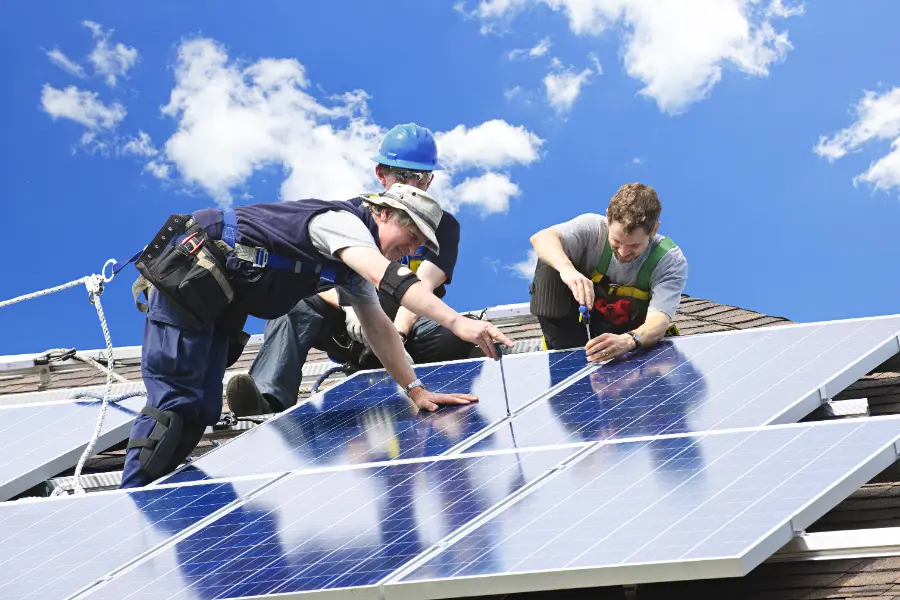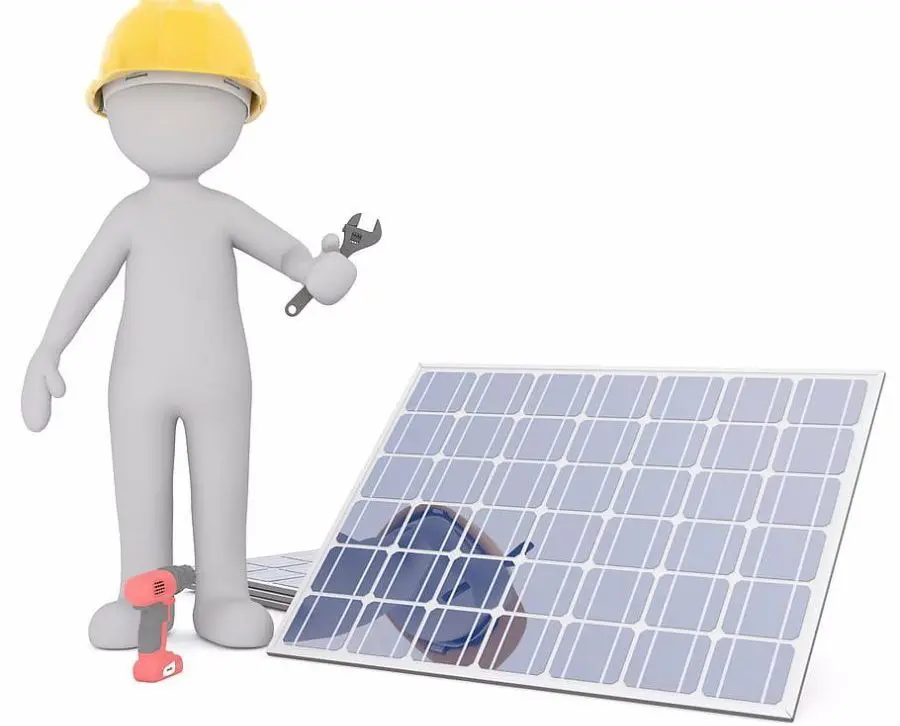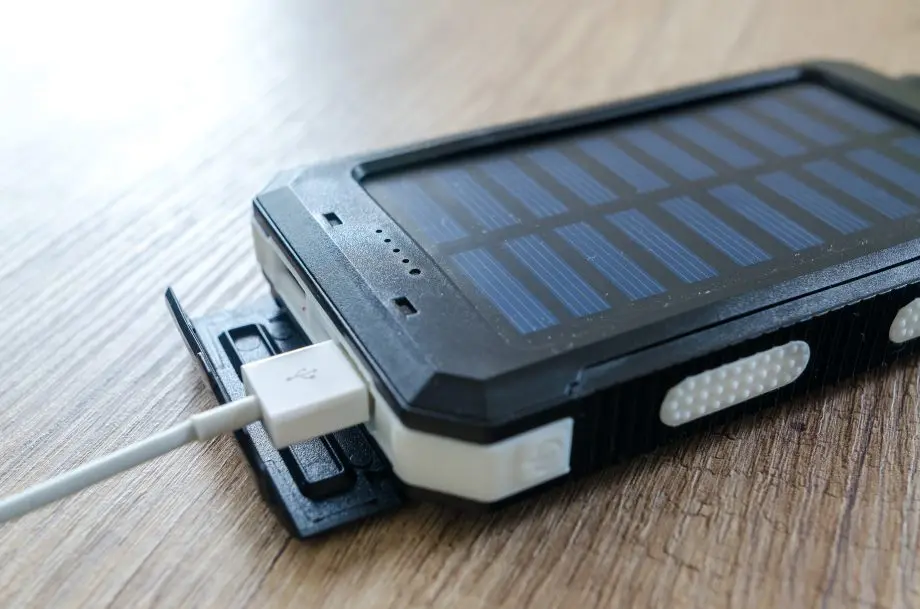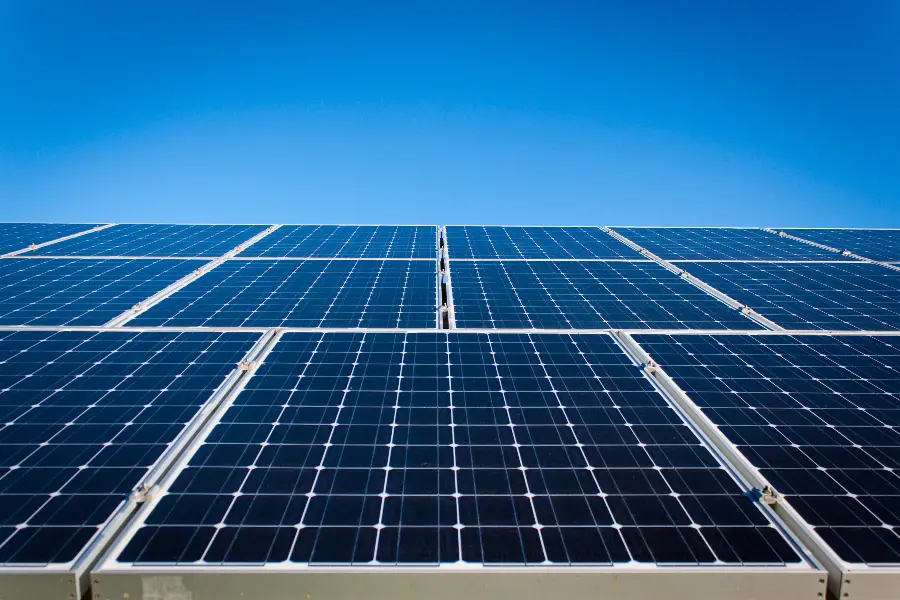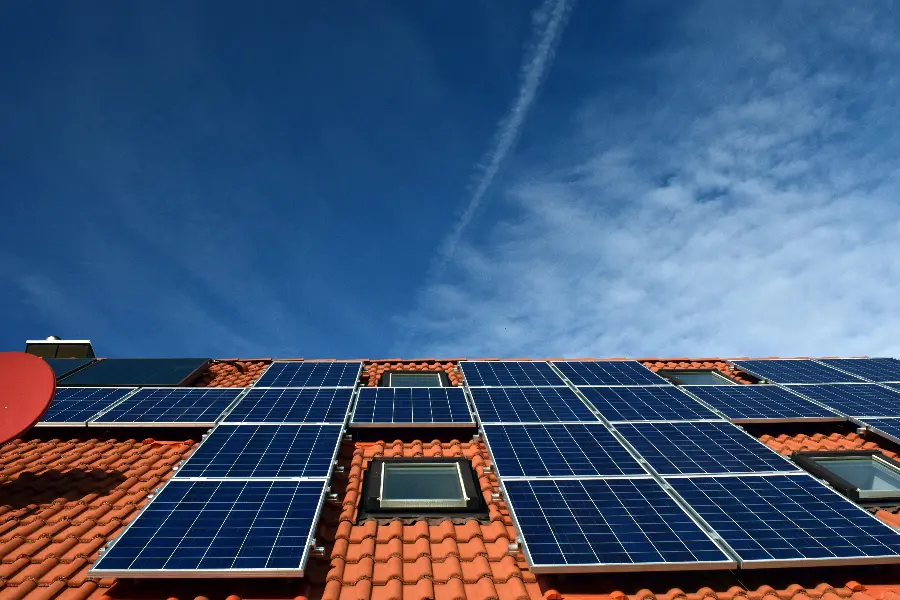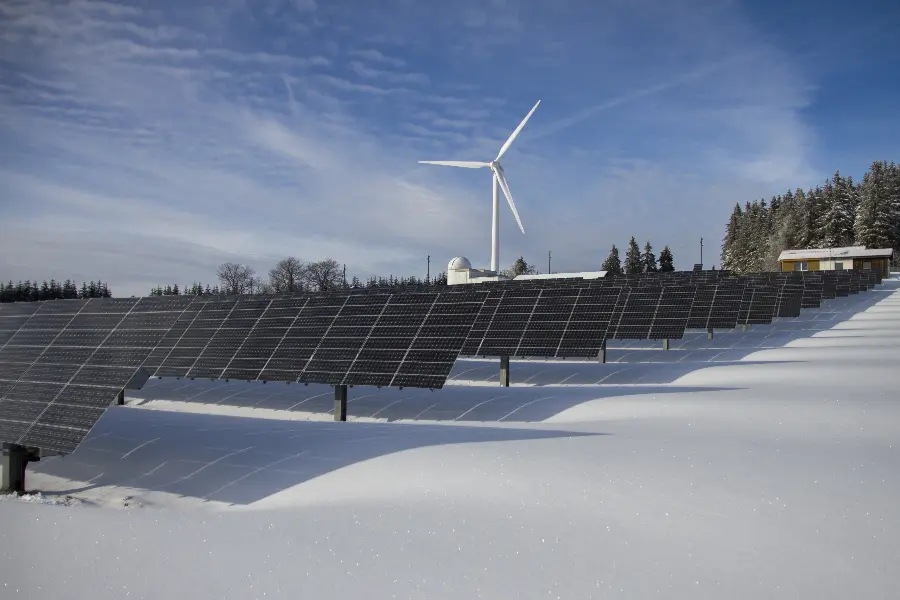
How does weather affect solar panels? Find out in our easy-to-understand guide. Uncover the impact of sun, rain, wind, and snow on your solar energy output.
Ever looked up at the sky during cloudy weather and wondered, How does weather affect solar panels? Well, you’re not alone.
It’s a common question, especially for those considering the switch to renewable energy.
In this blog post, we’ll dive into the fascinating world of solar energy, exploring how everything from sunny days to winter snowstorms can impact the performance of your solar panels.
So, whether you’re a solar enthusiast or just solar-curious, stick around as we unravel this intriguing topic!
How Does Weather Affect Solar Panels?
Have you ever found yourself pondering ‘How does weather affect solar panels?’ If so, you’re in the right place!
In this comprehensive guide, we’re going to explore the ins and outs of solar panel performance in various weather conditions.
We’ll delve into the effects of temperature, the role of clouds and rain, the impact of snow, and even the influence of wind on solar power.
Plus, we’ll share some handy tips on how to mitigate weather impacts and keep your photovoltaic panels performing at their best.
So, let’s embark on this solar journey together and shed some light on these burning questions!
Brief Overview of Solar Panels and Their Increasing Popularity
Solar panels, those sleek, shiny fixtures you see popping up on rooftops everywhere, are more than just a modern home accessory.
They’re a testament to the growing shift towards renewable energy. As concerns about climate change rise, so does the popularity of these sun-powered wonders.
They’re transforming the way we generate electricity, turning ordinary homes into personal power stations. And the best part?
Solar cells are fueled by the sun, an energy source that’s not only abundant and free but also doesn’t contribute to greenhouse gas emissions.
It’s no wonder solar panels are becoming a common sight in neighborhoods across the globe!
Importance of Understanding the Impact of Weather on Solar Panels
But here’s the thing: while the sun is the main player in solar energy production, it’s not the only factor that matters.
The weather, believe it or not, plays a significant role too. Understanding how different weather conditions affect solar panels is crucial for anyone considering solar energy.
Why, you ask? Well, it helps set realistic expectations about power output, informs decisions about panel placement and maintenance, and even influences the choice of solar equipment.
So, as we delve deeper into the world of solar energy, let’s keep an eye on the sky and see how the weather shapes our solar experience.
Ready to dive into the world of solar energy? Great! But before we explore how weather impacts solar panels, let’s take a moment to understand how these incredible devices work.
It’s a bit like a backstage tour, where we pull back the curtain on solar panels to reveal the science and technology behind the scenes.
So, buckle up and prepare for a journey into the heart of your solar system, where sunlight transforms into electricity.
It’s a fascinating process, and understanding it will make the rest of our solar adventure even more exciting!
Basic Principle of Photovoltaic Cells
Let’s start our backstage tour with the stars of the show: photovoltaic cells.
These are the tiny units that make up a solar panel, and they’re where all the magic happens.
When multiple solar panels are connected together it’s called a solar array. But what exactly is this magic they produce?
Well, it’s all about a neat little process called the photovoltaic effect. In simple terms, this is the ability of certain materials to generate an electric current when they’re exposed to light.
It’s like a superpower that these cells have, and it’s what allows them to take the sun’s energy and turn it into something we can use. Pretty cool, right?
Conversion of Sunlight into Electricity
Now, let’s talk about how this conversion process works.
When sunlight hits a solar panel, it’s absorbed by the photovoltaic cells.
These cells are made of semiconductor materials, usually silicon, which get all excited when they’re bathed in light.
This excitement causes electrons in the cells to move, creating an electric current.
This current is then captured and directed into an electrical circuit, where it can be used to power anything from your fridge to your TV.
So, the next time you’re enjoying a cold drink or watching your favorite show, remember: it’s all thanks to the amazing process happening on your rooftop!
Impact of Different Weather Conditions on Solar Panels
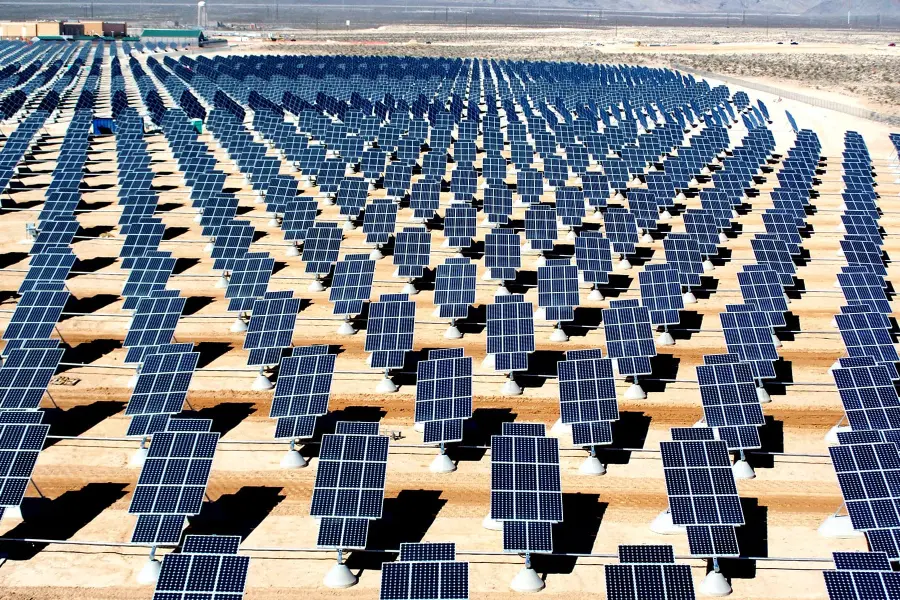
Now that we’ve got a handle on how solar panels work, it’s time to explore how different weather conditions can impact their performance.
You might be thinking, ‘Wait, don’t solar panels just need the sun to work?’ Well, yes, but it’s a bit more complex than that.
The weather can play a surprising role in how much energy your solar panels produce.
From the heat of summer to the chill of winter, from clear, sunny days to cloudy, rainy ones, each condition brings its own challenges and opportunities.
So, let’s dive in and see how solar panels weather the weather, shall we?
Effect of Temperature on Solar Panel Efficiency
Performance in Cold Weather
You might think that solar panels love the heat since they’re all about harnessing the power of the sun.
But in reality, they’re a bit like us humans – they prefer milder, cooler temperatures.
In fact, solar panels can actually perform better in colder conditions! This is because photovoltaic cells become more efficient as the temperature drops.
So, if you’re in a region with chilly winters, don’t worry – your solar panels won’t be taking a winter break!
Performance in Hot Weather
On the flip side, when the temperature rises, solar panel efficiency can take a hit.
This is due to the temperature coefficient of solar panels, a measure of how much output decreases for each degree above a certain temperature (usually around 25°C or 77°F).
But don’t let this deter you from going solar if you live in a hot climate with higher temperatures.
Even in the heat, solar panels can still produce plenty of power but they just might need a bit of shade or cooling to keep their performance up.
Solar Panels in Cloudy or Rainy Weather
Efficiency on Cloudy Days
Cloud cover might seem like a solar panel’s worst enemy, but that’s not entirely true.
While it’s true that solar panels generate less electricity on overcast days, they don’t stop working altogether.
They can still produce power from indirect sunlight, so even on a cloudy day, your solar panels are still on the job harvesting the sun’s rays.
Efficiency on Rainy Days
And what about when it’s raining? Well, rain can actually be beneficial for solar panels.
While heavy rain might temporarily reduce power output, it also helps clean the panels, removing dust and dirt that could otherwise block sunlight.
So, a rainy day now and then can actually help keep your solar panels running efficiently!
Solar Panels in Snow
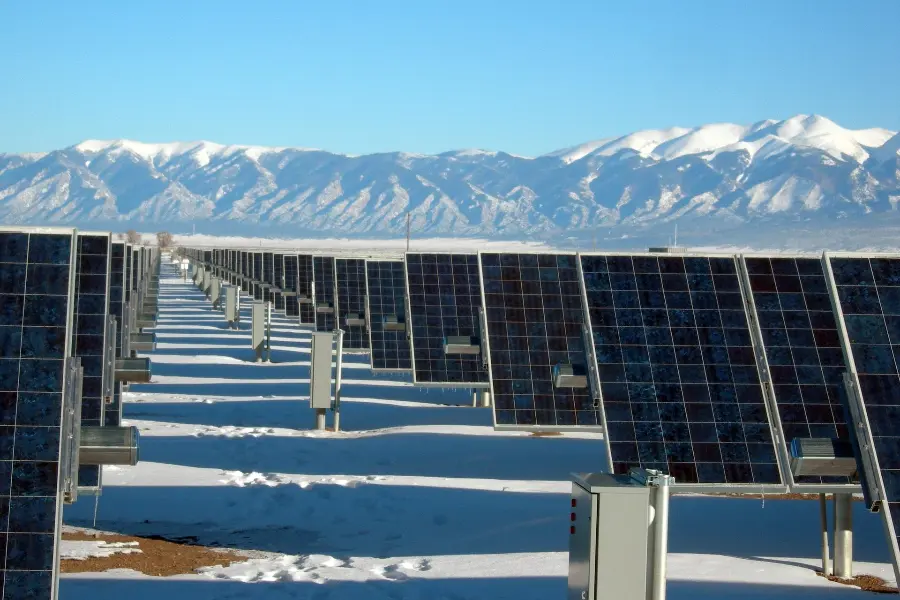
Impact of Snow Accumulation
Snow can be a bit of a double-edged sword for solar panels. On one hand, a layer of snow can block sunlight and reduce power output.
On the other hand, the reflective properties of snow can actually increase the amount of sunlight hitting the panels, potentially boosting their performance.
Snow Removal and Panel Efficiency
When it comes to snow removal, it’s usually best to let nature take its course.
Most solar panels are installed at an angle, so snow will often slide off on its own.
Plus, the heat generated by the panels can help melt the snow. However, if heavy snow has completely covered your panels, you might need to clear it off. Just be sure to do so safely!
Effect of Wind on Solar Panels
Cooling Effect of Wind
Wind can have a cooling effect on solar panels, which can be a good thing. Remember, solar panels like cooler temperatures, so a nice breeze can help keep them from overheating on hot days, improving their efficiency.
Wind and Panel Durability
But what about high winds? Can solar panels withstand them? The answer is yes.
Solar panels are designed to be durable and can typically withstand normal wind conditions.
However, in areas prone to extreme winds or hurricanes, additional measures like wind-resistant mounting systems might be necessary to protect the panels.
Mitigating the Impact of Weather on Solar Panels
So, we’ve seen how various weather conditions can impact solar panels. But don’t let that cloud your solar dreams!
There are plenty of ways to mitigate these effects and keep your solar system performing at its best, come rain or shine, wind or snow.
In this section, we’ll explore some of these strategies, from backup generators to proper solar panel installation and regular maintenance.
So, if you’re ready to weatherproof your solar experience, read on!
Use of Backup Generators
Even with the best weather-proofing strategies, there may be times when your solar panels can’t produce enough power to meet your needs due to extreme weather events.
This is where backup generators come in. Having a backup generator can provide an extra layer of security, ensuring you have power during prolonged periods of poor weather or at night when your solar panels aren’t producing electricity or if your local grid is experiencing power outages.
While it’s not a solution for everyday use, a backup generator can be a real lifesaver in a pinch!
Solar Generator DELTA 2
Here is a solar generator if you don’t want to use a conventional generator. Quiet and nonpolluting and can be set up anywhere there’s sun for the panels.

Solar Generator DELTA 2 with 2x220W Portable Solar Panels
Proper Installation and Positioning
The way your solar panel system is installed and positioned can have a big impact on its performance.
For starters, they should be installed at an angle that maximizes their exposure to the sun.
This angle will depend on your location and the time of year. Additionally, if possible, panels should be installed in a location that minimizes shading from trees or other structures.
Remember, more sunlight equals more power!
Regular Maintenance and Cleaning

Lastly, regular maintenance and cleaning are key to keeping your solar panels working efficiently.
This includes checking for any physical damage, ensuring the mounting system is secure, and keeping the panels clean.
Dust, dirt, bird droppings, or snow can block sunlight and reduce your panels’ power output.
Regular cleaning can help ensure your panels are getting as much sunlight as possible.
Just remember to clean them safely – if your panels are on the roof, it might be best to hire a professional.
Does Weather Affect Solar Panels FAQs
Got questions? We’ve got answers! In this section, we’ll tackle some of the most frequently asked questions about how weather affects solar panels.
From rain and snow to heat and wind, we’ll cover it all. So, if you’ve been wondering about these topics, stick around, we’re about to clear up some common solar queries!
Q: Do solar panels work in the rain?
A: Absolutely! While solar panels might produce less electricity during heavy rain, they don’t stop working.
In fact, rain can be beneficial as it helps clean the panels, removing dust and dirt that could block sunlight.
Q: Can solar panels withstand snow and wind?
A: Yes, they can. Solar panels are designed to be durable and can typically withstand normal wind and snow conditions.
In areas prone to extreme winds or heavy snowfall, additional measures like wind-resistant mounting systems or snow removal may be necessary.
Q: How does heat affect solar panels?
A: Interestingly, while solar panels need sunlight to produce electricity, they don’t necessarily love heat.
As temperatures rise, solar panel efficiency can decrease due to the temperature coefficient of the panels.
However, even in hot weather, solar panels can still produce a significant amount of power.
How Does Weather Affect Solar Panels Conclusion
Solar Generator DELTA 2 with 2x220W Portable Solar Panels
As we wrap up our deep dive into how weather affects solar panels, it’s time to reflect on what we’ve learned.
We’ve journeyed from the inner workings of solar panels to the impact of various weather conditions and even explored some strategies for weather-proofing your solar experience.
But as with any journey, it’s not just about the destination – it’s about the insights we’ve gained along the way.
So, let’s take a moment to recap and consider the resilience and benefits of solar energy in our conclusion.
Recap of the Impact of Weather on Solar Panels
We’ve seen how various weather conditions can impact the performance of solar panels.
From the surprising fact that solar panels actually prefer cooler temperatures, to the resilience of panels in cloudy and rainy conditions, and even the double-edged sword of snow and wind.
We’ve also learned that while the weather can influence solar panel efficiency, it doesn’t stop them from doing their job.
With the right strategies, like backup generators, proper installation and positioning, and regular maintenance, we can mitigate these impacts and keep our solar systems running smoothly.
Final Thoughts on the Resilience and Benefits of Solar Energy
As we conclude, it’s worth reflecting on the incredible resilience of solar energy.
Despite the challenges that weather can bring, solar panels continue to harness the power of the sun, providing a renewable and environmentally friendly energy source.
The benefits of solar energy extend beyond our electricity bills. By reducing our reliance on fossil fuels, we’re also contributing to a healthier planet.
So, whether you’re already a solar panel owner or considering becoming one, remember that every bit of sunlight captured is a step towards a brighter, more sustainable future.

